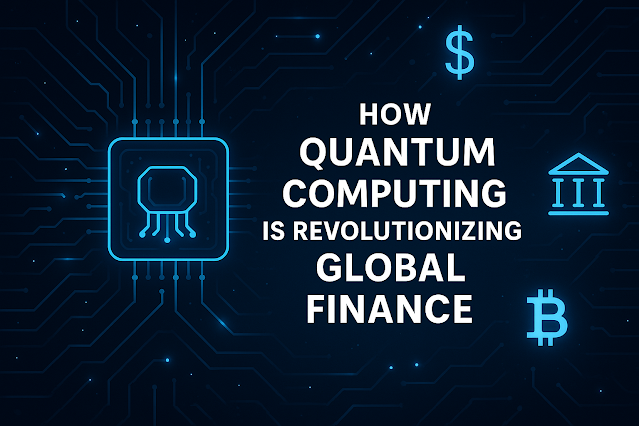Introduction: Why Quantum Computing Is the Future of Finance
Quantum computing is not just a technological buzzword—it’s a powerful force poised to redefine how the global financial system operates. With increasing data volume, growing cybersecurity threats, and outdated transaction infrastructures, traditional systems are under pressure. That’s where quantum computing in financial systems emerges as a revolutionary solution.
If you're curious about what quantum computing is and how it's changing the financial landscape, the Quantum Computing and the New Monetary Distribution System video series offers a comprehensive, accessible, and engaging educational experience. Whether you're a tech enthusiast, financial analyst, or curious learner, this video course breaks down complex topics like qubits, quantum encryption, and decentralized finance in a way that anyone can understand.
What Is Quantum Computing?
Quantum computing employs the principles of quantum mechanics to handle data. Unlike traditional computers that rely on bits (0 or 1), quantum computers utilize qubits, which can exist in multiple states simultaneously due to superposition and entanglement.
This enables quantum computers to perform computations at speeds previously thought impossible. In real-world terms, this translates to faster algorithms, more secure encryption, and the ability to simulate financial markets with unprecedented precision.
Traditional Monetary Systems: Where They Fall Short
Today’s monetary systems—whether managed by central banks, financial institutions, or blockchain networks—struggle with:
-
Latency in transactions
-
Scalability limitations
-
Security breaches and fraud
-
High infrastructure costs
-
Centralization vulnerabilities
These problems make it clear why an upgrade is overdue. Traditional computing systems can only go so far in solving them efficiently.
Quantum Computing in Financial Systems: A Game Changer
Enter quantum computing for secure transactions. Here's how quantum technology will reshape financial systems:
1. Ultra-Secure Financial Transactions
Quantum encryption—especially quantum key distribution (QKD)—offers security so advanced that it's theoretically unbreakable. This could eliminate the risks of data breaches, identity theft, and cyber fraud, which cost the global economy billions annually.
Trusted source: IBM on Quantum Security
2. Real-Time Settlement and Processing
Quantum computing allows for real-time processing of transactions, reducing delays in banking, trading, and cross-border payments. This is vital for fintech platforms and decentralized finance (DeFi) systems that rely on instant data validation.
3. Advanced Algorithmic Trading
High-frequency trading (HFT) firms can leverage quantum algorithms to process huge datasets and make trading decisions in microseconds, giving them a competitive edge in financial markets.
4. Decentralized and Scalable Monetary Systems
Quantum systems support decentralized structures without compromising on speed or scalability. This aligns with the vision of a new monetary distribution system—decentralized, transparent, and ultra-fast.
What You’ll Learn in the Quantum Computing Video Series
The Quantum Computing and the New Monetary Distribution System course is a visually immersive, expertly explained journey through:
✅ Introduction to Quantum Mechanics
Grasp the basics of quantum physics, superposition, and entanglement without needing a physics degree.
✅ What Are Qubits and How Do They Work?
Understand the building blocks of quantum computing with engaging animations and real-world examples.
✅ Traditional vs. Quantum Monetary Systems
Compare the flaws of the current system with the advantages of quantum-based infrastructure.
✅ Quantum Encryption for Finance
Dive into quantum cryptography and learn how it ensures 100% secure financial data transmission.
✅ The Future of Decentralized Finance (DeFi)
See how quantum computing enhances decentralized finance protocols for mass adoption.
✅ Expert-Led Video Lessons
All content is delivered through clear storytelling, expert commentary, and high-quality visuals to keep you engaged.
This is not a dry textbook—it’s a complete visual learning experience designed for learners of all backgrounds.
Who Should Watch This Course?
This quantum computing video series is perfect for:
-
Financial professionals wanting to future-proof their knowledge
- For those interested in Crypto and Defi but don't know where to start, this guide is for you!
-
Students and tech learners exploring new-age technologies
-
Business leaders seeking scalable financial infrastructure solutions
You don’t need a technical background. The course is accessible, intuitive, and engaging—perfect for both beginners and professionals.
Why This Matters: Quantum Computing and Economic Equality
Beyond speed and security, quantum monetary systems could level the global financial playing field. Here's how:
-
Access for All: Decentralized models reduce the need for intermediaries like banks, enabling broader financial inclusion.
-
Lower Costs: Real-time, secure transactions cut down on banking fees and international transfer costs.
-
Anti-Fraud Framework: The framework for combating fraud and corruption includes quantum security measures, which help prevent financial manipulation and ensure transparency.
How to Get Started
👉 Ready to explore the future of money and computing?
Click below to watch the Quantum Computing and the New Monetary Distribution System video series.
This is more than just a course. It’s a deep dive into the next frontier of finance, technology, and security.
Frequently Asked Questions
Q1: Do I need a background in quantum physics to understand this?
No. The course is designed for everyday learners and uses real-world examples and animations to explain even the most complex ideas.
Q2: Is this relevant for cryptocurrency and DeFi users?
Absolutely. Quantum computing will influence blockchain security, transaction speeds, and smart contract logic.
Q3: How long is the course?
The video series is broken into short, digestible lessons so you can learn at your own pace.
Real-World Examples of Quantum in Finance
Leading institutions are already investing in this tech:
-
JP Morgan Chase collaborated with IBM Quantum to investigate the application of quantum algorithms in portfolio optimization.
-
Goldman Sachs is working with quantum software firms to develop financial models.
-
China’s Central Bank is experimenting with quantum-resistant digital currency frameworks.
Trusted source: Forbes - Quantum Computing in Finance
These initiatives confirm that quantum computing is not theoretical—it's practical and already being implemented.
My Verdict: Be Ahead of the Curve
If you wait until quantum computing becomes mainstream, you’ll be too late. Now is the time to understand and embrace this transformation—especially in how we handle, move, and secure money.
🚀 Explore the QComp System Now
Discover an AI-powered system designed to simplify online workflows and help users leverage modern technology more efficiently. Ideal for beginners looking to explore smarter digital solutions.
EXPLORE NOW →AI-driven system • Beginner-friendly • Results depend on usage
Affiliate Disclaimer: This post may contain affiliate links. If you purchase through these links, I may earn a small commission at no extra cost to you. Read my full disclosure here.
Explore more posts on Top Digi Tips.

Sudip Baidya is a digital marketer and passionate blogger behind TopDigitips , where he helps beginners and online creators use digital tools, AI software, and proven strategies to build profitable online businesses.



